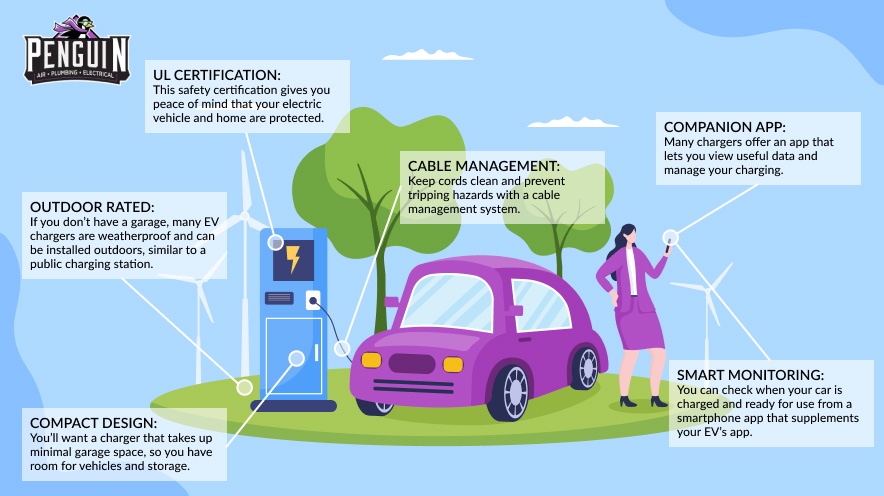Electric vehicles are an eco-friendly choice that reduces time and money spent at the pump.
But this switch is only convenient if you have a reliable way to charge your vehicle. Don’t get stuck waiting in long lines at public charging stations or starting your day with a dead battery.
With a home EV charging station from Penguin Air, Plumbing & Electric, you can quickly and conveniently charge your car at home so that you’re always ready for your next drive.
Here’s what you need to know about electric car chargers:
Do I Need an EV Charging Station Before I Get an Electric Vehicle?
You don’t need to install an EV charging station before getting an electric vehicle. However, you will get a superior charge with a level 2 charger that plugs into a garage or driveway outlet that has a dedicated 240V circuit.
We recommend starting the EV charging station installation process before your car is delivered. That way, you can more easily acclimate in the first few weeks of having your electric car and have easy and reliable access to a charger.
Can I Charge My EV in a Standard 120-Volt Outlet?
Your new EV will typically come with a 120V, or level 1, charging cable that you can use in any standard outlet, though it will be a significantly slower charge.
A level 1 charger will only get about 4 miles of drive range for every hour charged. With a Level 2 charger, you can get 32 miles of drive range per hour of charge — almost 8 times faster than a level 1 charger.
What Are the Differences Between Level 1, 2 & 3 EV Chargers?
There are three levels of EV chargers on the market:
- Level 1 chargers can be plugged into a standard outlet but can take over 24 hours to provide a full charge.
- Level 2 chargers offer 80% battery charge in four to five hours and require a dedicated circuit directly connected to your electrical panel.
- Level 3 chargers are incredibly fast but are expensive and require more energy than is typically available in a home. They’re primarily used for public charging.
The best option for your home is a level 2 charger, which provides the speed you lack with a level 1 but is a more affordable choice than a level 3.
Do All Electric Cars Use the Same Charger?
Some EVs are incompatible with level 3 chargers, but all electric cars can use level 1 and 2 chargers, regardless of the manufacturer.
Universal charging makes it easy to own and charge multiple EVs and allows guests to charge their electric cars.
You also don’t have to worry about installing a new charging station if you purchase a new EV later. Once you invest in a level 2 home charger, you’re set with convenient and reliable charging for any electric car and brand.
Features To Look For in an EV Charging Station

A home EV charging station is a great investment. When choosing to add one to your home, consider these features:
- Compact design: You’ll want a charger that takes up minimal garage space, so you have room for vehicles and storage.
- Outdoor-rated: If you don’t have a garage, many EV chargers are weatherproof and can be installed outdoors, similar to a public charging station.
- UL certification: This safety certification gives you peace of mind that your electric vehicle and home are protected.
- Companion app: Many chargers offer an app that lets you view useful data and manage your charging.
- Smart monitoring: You can check when your car is charged and ready for use from a smartphone app that supplements your EV’s app.
- Cable management: Keep cords clean and prevent tripping hazards with a cable management system.
Choose Penguin for EV Charger Installation in the Phoenix Metro Area
If you’re ready to switch to an electric vehicle or have one and need greater charging convenience, turn to Penguin Air, Plumbing & Electrical for electric car charger installation.
Our licensed electricians provide safe and reliable installation, so you’re ready to start charging your car quickly.
With upfront pricing and financing options on approved credit, there’s never been a better time to invest in your home with a new EV charging station.
Call Penguin at (480) 550-9943 to request an EV charger installation estimate.
